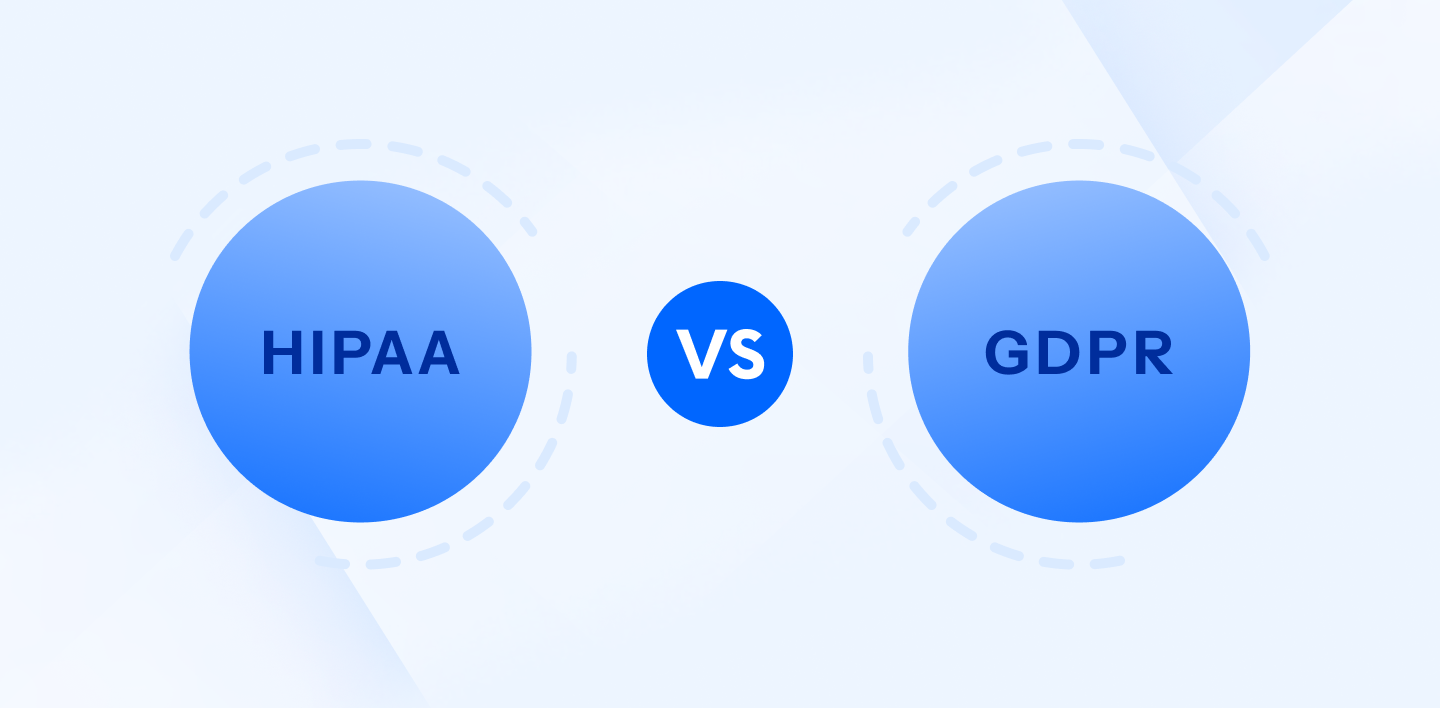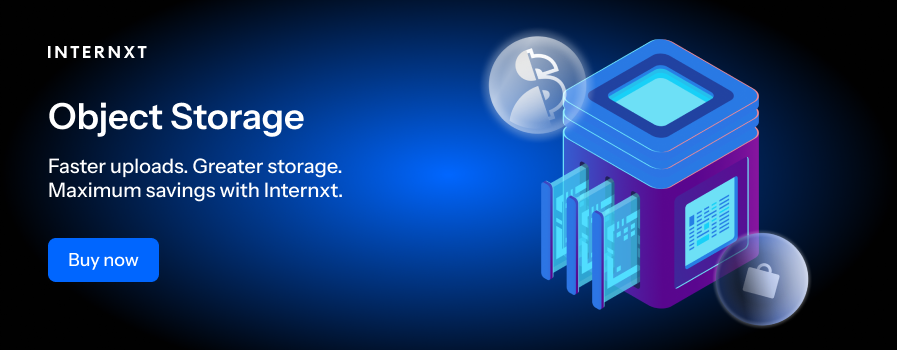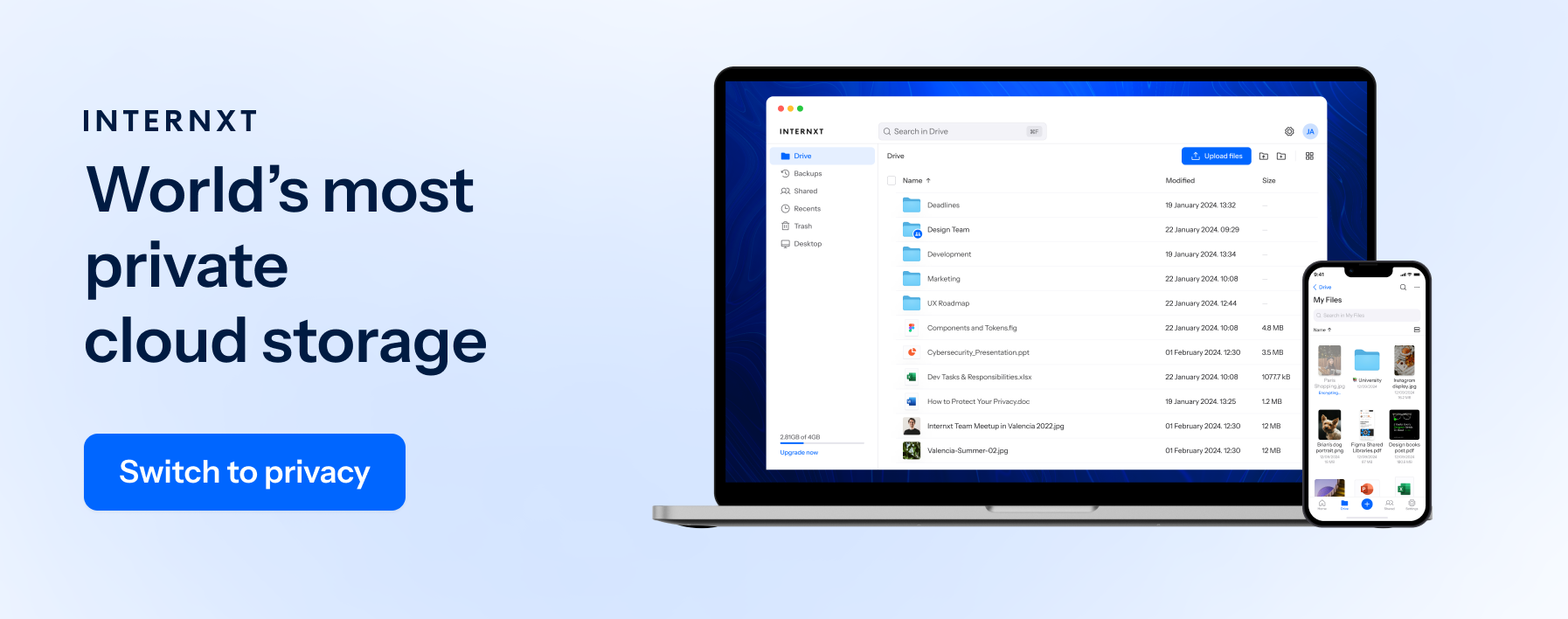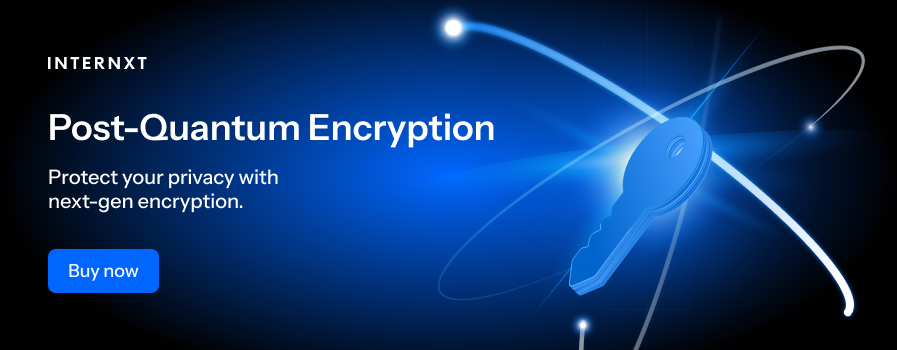HIPAA vs GDPR Differences You Need to Know

HIPAA and GDPR compliance laws are both essential laws from Europe and America to protect user data.
While HIPAA focuses on protecting medical and patient information to prevent the rise in healthcare data breaches, GDPR is broader, focusing on regulations that handle personally identifiable information (PII) of EU and UK citizens.
This article will explore HIPAA vs GDPR, who they apply to, what data they protect, plus similarities and differences so you can build a thorough understanding of these important compliance laws.
Table of contents
- What is HIPAA compliance?
- What is GDPR?
- Differences between HIPAA vs GDPR compliance
- Similarities of HIPAA and GDPR
- Gain GDPR or HIPAA compliance with Internxt Drive
What is HIPAA compliance?
The Health Insurance Portability and Accountability Act, HIPAA, is a US legal act of laws and regulations to protect sensitive patient information.
Since its inception in 1996, HIPAA has changed drastically to evolve to the threats of cyberattacks and protect data in line with advances in technology. Its main purpose, however, is to:
- Protect patients’ health information (PHI).
- Ensure healthcare bodies follow the necessary standards when handling data.
- Ensure patients can control how their information is used and shared with others by requesting access to and correcting their records.
PHI is categorized as information that could identify a patient, such as:
- Billing information
- Insurance accounts
- Medical history
- Mental health conditions
- Lab or test results
HIPAA regulations are enforced by the US Department of Health and Human Services’ Office for Civil Rights (OCR), and non-compliance can result in fines of millions of dollars in the case of a healthcare data breach, plus significant damage to their reputation.
So as we can see, the first thing to note for HIPAA vs GDPR is that HIPAA focuses on protecting healthcare information within the US only.
Who needs to comply with HIPAA regulations?
Any industry that handles PHI must have the necessary security protocols to ensure HIPAA compliance.
HIPAA also applies to external entities such as business associates and external contractors to further prevent data breaches or ransomware from affecting health data.
These associates or entities may include cloud storage, billing companies, or IT contractors, and they must sign an agreement to confirm they comply with and take the necessary action to protect sensitive patient data concerning these three rules:
- Privacy rule: designed to protect medical records and PHI by setting limits on who can access and share this data
- Security Rule: ensures the confidentiality, integrity, and availability of electronic protected health information.
- The Breach Notification Rule requires the company to notify affected individuals, the government, and in some cases the media when there is a healthcare data breach.

For more information on this topic, you can visit our HIPAA compliance blog article.
What is GDPR?
In 2018, The General Data Protection Regulation (GDPR) came into law in 2018, and is regarded as one of the best and most stringent data privacy and security laws to protect user data.
It was passed to protect personally identifiable information of customers within the EU and UK or companies operating within these regions. PII is any data that could be used to identify a person, including:
- Basic identifiers: Name, address, email address, ID number.
- Online identifiers: IP address, cookies, device data.
- Special categories: Health data, biometric data, racial or ethnic origin, political opinions, religious beliefs, sexual orientation.
- Professional data: Employment details, education records.
Unlike HIPAA, GDPR covers all businesses within the UK and Europe, regardless of what services they provide and includes recommendations for a data protection impact assessment, for added protection of consumer data.
The GDPR outlines seven principles to process data so it can be protected from current threats we face from hackers, scammers, and other threat actors.
- Data must be processed legally, fairly, and transparently.
- Data should only be collected for specific, explicit, and legitimate purposes.
- Only necessary data should be collected and processed.
- Data must be accurate and kept up to date.
- Data should not be kept longer than necessary and only for its intended purpose.
- Data must be processed securely to protect against unauthorized access, loss, or damage.
- Organizations must take responsibility for compliance and demonstrate the measures they take to ensure legal compliance.
For more information about GDPR compliance, we explore it in more detail in our blog article about the GDPR. For more information on how cloud storage providers like Internxt protect your data in adherence to GDPR, visit our GDPR cloud storage page.
Organizations, regardless of size, must also appoint a data protection officer (DPO) under certain circumstances, which are:
- It is a public authority or body
- It processes data that is regularly monitored on a large scale
- Its core activities consist of large-scale processing of special categories of data and/or personal data relating to criminal convictions and offenses.
Who needs to comply with the GDPR?
Any company operating within the UK or EU is legally obligated to comply with the GDPR. GDPR regulations also extend to companies operating outside these regions if they offer goods or services to, or monitor the behavior of, customers in the EU or UK.
This makes GDPR different from CCPA, for example, as the latter only applies to California residents.
Failure to comply with the GDPR can result in fines reaching the millions, and in 2023, Meta paid a fine of €1.2 billion for transferring personal data of European users to the United States without the necessary protocols in place to protect the data, making it more vulnerable to data leaks or breaches.
Differences between HIPAA vs GDPR compliance
Now we have a general overview of HIPAA and GDPR, it's time to look in more detail at HIPAA vs GDPR.

While the most obvious difference between HIPAA vs GDPR is the where and to whom the regulations apply to (US/EU, healthcare/all businesses handling personal data), there are some other key differences to be aware of when considering HIPAA vs GDPR.
HIPAA vs GDPR: consent
HIPAA can share some patient data to another healthcare provider without consent for cases such as the treatment of the patient. PHI could also be disclosed to other providers or business associates without patient consent.
GDPR, on the other hand, requires consent in all cases, including patient care.
HIPAA vs GDPR: right to be forgotten
HIPAA doesn’t allow for medical or other personal health information to be altered or deleted, meaning this data is stored forever.
Although the data is subject to security and privacy protocols, there is an increased chance of old data being leaked online and causing a breach that could have been avoided had it been deleted after a certain period of time.
For the GDPR, any individual can make a request to an organization to delete their data thanks to the right to be forgotten, giving individuals more protection against data breaches.
HIPAA vs GDPR data breach notification
HIPAA’s breach notification rule requires covered entities and business associates to notify all individuals of a data breach.
If the breach affects over 500 individuals, the organization must notify the Office for Civil Rights and all affected individuals within 60 days.
The GDPR, on the other hand, requires organizations to act much quicker. Article 33 of the GDPR places a deadline of 72 hours for a company to report the breach to authorities, regardless of the size.
Similarities of HIPAA and GDPR
While there are many differences between HIPAA vs GDPR, there are some similarities. The main one of course being the protection of sensitive information.
Other similarities and overlaps of the two include:
- Both protect personal data and privacy rights
- Both apply to organizations that handle sensitive personal information
- Require consent for data use and disclosure
- Mandate security measures to protect data
- Require breach notification to authorities and affected individuals
- Impose penalties for non-compliance
- Emphasize individual rights to access and control their data
If you’re HIPAA compliant, then you already should have the necessary arrangements to protect sensitive patient data.
However, following HIPAA on its own is not enough for GDPR compliance, as these laws are much stricter so your business must ensure they have an indepth knowledge of the GDPR to avoid compliance fines.
Gain GDPR or HIPAA compliance with Internxt Drive
Internxt is a European tech company based in Valencia, Spain, and complies with GDPR regulations to protect your data.
Internxt implements the necessary security measures to protect user data as required by the GDPR and HIPAA which include:
- Zero-knowledge and post-quantum cryptography
- Access controls
- Two-factor authentication
- Password-protected file sharing
- And much more

Furthermore, Internxt doesn’t share or view any of your data, as everything is encrypted directly on your device, so you have total control over your cloud storage.
Aside from Internxt Drive, Internxt’s pricing plans also include the biggest privacy suite of products to protect you online with its lifetime or annual plans.
When you buy a plan with Internxt, you get:
Essential:
- 1TB zero-knowledge encrypted storage
- Post-quantum encryption
- Ultra fast unlimited VPN (FR)
- Antivirus
- Backup your files
- Password-protected file sharing
- GDPR compliance
- Two-factor authentication (2FA)
- CLI, WebDav & Rclone support
Premium includes everything above, plus
- 3TB zero-knowledge encrypted storage
- Ultra fast unlimited VPN (FR, DE, PL)
- Device Cleaner - clean and optimize your device Coming soon
- Dark Web Monitor: get notified if your email has been breached online Coming soon

Ultimate is Internxt’s complete privacy suite, including everything from Essential and Premium, plus:
- 5TB zero-knowledge encrypted storage
- Post-quantum encryption
- Ultra fast unlimited VPN (FR, DE, PL, CA, UK)
- Device Cleaner Coming soon
- Meet
- Mail Coming soon
Check out Internxt’s pricing page for the most secure and private GDPR cloud storage, or check out our Business, Family, or S3 storage plans.

